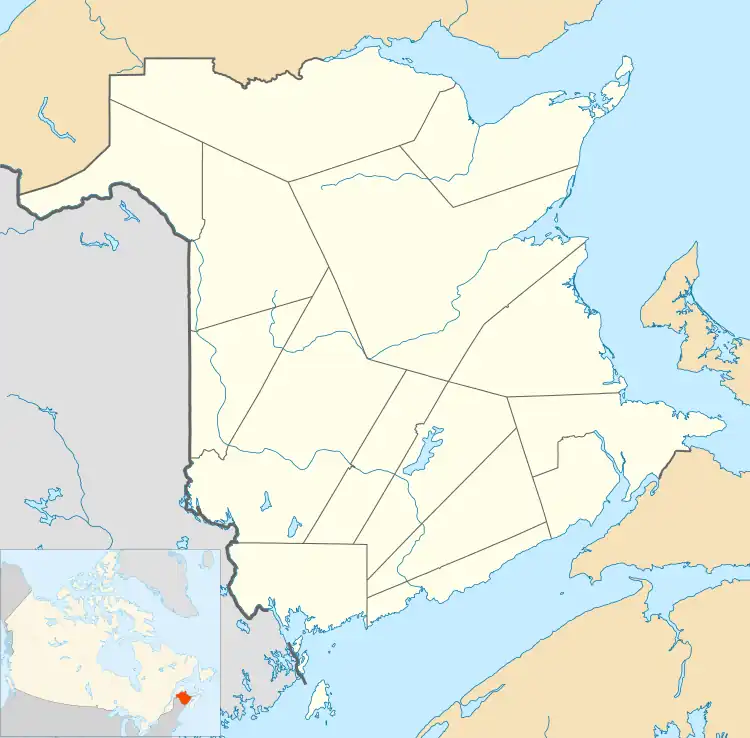Shediac
Shediac (official in both languages; Shédiac is colloquial French) is a heavily Acadian town in Westmorland County, New Brunswick. The town is home to the famous Parlee Beach and is known as the "Lobster Capital of the World". It hosts an annual festival every July which promotes its ties to lobster fishing. At the western entrance to the town is a 90-ton sculpture called The World's Largest Lobster.[2] It is believed that chiac, a well-known Acadian French patois, was named after Shediac.[3]
Shediac | |
|---|---|
Town | |
 Entrance to the town | |
 Seal  Coat of arms | |
| Nickname: Lobster Capital of the World | |
| Motto(s): | |
 Shediac | |
| Coordinates: 46°13′N 64°32′W | |
| Country | Canada |
| Province | New Brunswick |
| County | Westmorland County |
| Parish | Shédiac Parish |
| Founded | 18th century |
| Incorporated | 1903 |
| Government | |
| • Type | Town Council |
| • Mayor | Roger Caissie |
| • Governing Body | Shediac Town Council |
| Area | |
| • Land | 64.00 km2 (24.71 sq mi) |
| Elevation | Sea level to 33 m (0 to 108.3 ft) |
| Population (2021)[1] | |
| • Total | 7,535 |
| • Density | 117.7/km2 (305/sq mi) |
| • Change (2016–21) | |
| Time zone | UTC-4 (Atlantic (AST)) |
| • Summer (DST) | UTC-3 (ADT) |
| Canadian Postal code | E4P |
| Area code | 506 |
| Telephone Exchange | 312 351 530 531 532 533 |
| NTS Map | 21I2 Moncton |
| GNBC Code | DACUC |
| Highways | |
| Website | http://www.shediac.org |
Since its founding it has expanded several times, most recently in 2023, when it annexed all or part of four local service districts.[4][5] Revised census figures have not been released.
Etymology
Shediac was originally called La Batture. Its name was later changed to Shediac in reference to its position at the basin of the Shediac River. The name "Shediac" itself is derived from the Micmac word Esedeiik, which means "which comes from far away", possibly in reference to the Shediac Bay or the current of the Petitcodiac river.[6]
Geography
Shediac is situated primarily on Route 133 around Shediac Bay, a sub-basin of the Northumberland Strait.
Its topography is relatively flat and its soil is mostly composed of sedimentary rocks dating from the Pennsylvanian. Shediac enjoys a continental climate.[7]
The town is located southwest and adjacent to the community of Pointe-du-Chêne, once the eastern terminus of the European and North American Railway as well as a stopover for Pan-Am's transatlantic "clipper" air service featuring large seaplanes. Imperial Airways' flying boat service to Foynes in Ireland also used the facilities.
History
Hundreds of years ago, the Mi'kmaq encampment of "Es-ed-ei-ik" was one of the major camps in southeast New Brunswick. The Mi'kmaq word "Es-ed-ei-ik" which means "running far in" (in reference to the tide, which has a long range over the shallow, sandy beaches) eventually transformed into Gédaique.[8]
Acadians first arrived at Shediac in 1751 as a result of the Acadian Exodus from peninsular Nova Scotia.[9] During the French and Indian War, French officer Charles Deschamps de Boishebert made his headquarters at both Shediac and Cocagne, New Brunswick. In the autumn of 1755, Boishebert established himself on the south shore of Cocagne Bay, a place known as Boishebert's Camp. The following year, Boishebert moved to Miramichi, New Brunswick, specifically to Beaubears Island.[10] After the war, Acadians returned to the region in 1767.
.jpg.webp)
Today many francophones use the spelling Shédiac; however, the town's name upon its incorporation did not feature an accented "e", and correspondingly the official geographic name for the community is Shediac.
Shediac Bay Yacht Club
Shediac Bay Yacht Club is on the Register of 'Canada's Historic Places' for being the location of a local wharf for nearly a century. The previous Shediac Bay Yacht Club House was designed by Roméo Savoie.[11]
Demographics
In the 2021 Census of Population conducted by Statistics Canada, Shediac had a population of 7,535 living in 3,293 of its 3,447 total private dwellings, a change of 13.1% from its 2016 population of 6,664. With a land area of 64 km2 (25 sq mi), it had a population density of 117.7/km2 (304.9/sq mi) in 2021.[1]
|
Income (2015)[12]
|
Mother tongue (2016)[12]
| |||||||||||||||||||||||||||||||||||||||||||||||||||||||||||||||||||||||||||||
Notable people
- Georges-Antoine Belcourt (1803–1874), missionary
- Edna May Williston Best (1880–1923), feminist
- Emile Duprée (1936–2023), former professional wrestler and promoter
- René Duprée (1983 – ), professional wrestler, former WWE wrestler, son of Émile Dupree
- Muriel McQueen Fergusson (1899–1987), Canadian senator
- Gord Gallant (1950 – ), professional hockey player
- Placide Gaudet (1850–1930), journalist, historian
- Daniel Lionel Hanington (1835–1909), former Premier of New Brunswick
- Rosa Laricchiuta (1974 – ), professional singer
- Joseph E. Leblanc (born 1916), politician
- Samuel Lee (1756–1805), judge, politician
- Anna Malenfant (1905–1988), singer, educator and composer
- Edward R. McDonald (1872–1952), lawyer, politician, mayor, inventor of the Crossword Game, 1926
- Olivier-Maximin Melanson (1854–1926), Acadian businessman and politician
- A. P. Paterson (1870–1957), politician
- Scott Pellerin (b. 1970), former professional hockey player
- Pascal Poirier (1852–1933), writer, lawyer, senator
- Jean George Robichaud (1883–1969), politician
- Ferdinand-Joseph Robidoux (1875–1962), lawyer, politician
- Wes Sheridan, Canadian politician
- Albert James Smith (1822–1883), former Premier of New Brunswick
- Ernest A. Smith (1864 – ?), Canadian politician
- Elsie Wayne (1932–2016), politician
- John Clarence Webster (1862–1950), physician, historian
Sister city
- Breaux Bridge, Louisiana since 1970[13]
See also
References
- "Census Profile of Shediac, Town (TV)". Statistics Canada. December 6, 2022. Retrieved January 21, 2023.
- "BigThings.ca: Town of Shediac, New Brunswick". Big Things: The Monuments of Canada. Retrieved November 12, 2014.
- Yves Cormier, Dictionnaire du français acadien, Montréal, Fides, 2009 (ISBN 978-2-7621-3010-2), p. 138-139.
- "Local Governments Establishment Regulation – Local Governance Act". Government of New Brunswick. October 12, 2022. Retrieved January 21, 2023.
- "RSC 7 Southeast Regional Service Commission". Government of New Brunswick. Retrieved January 21, 2023.
- Alan Rayburn, Geographical Names of New Brunswick, Ottawa, Énergie, Mines et Ressources Canada, 1975, p. 252.
- Ministère des Ressources naturelles et de l'énergie du Nouveau-Brunswick, « Bedrock Geology of New Brunswick » [archive], 2000 (consulté le 19 juin 2009)
- Rand, Silas Tertius (January 1, 1875). A First Reading Book in the Micmac Language: Comprising the Micmac Numerals, and the Names of the Different Kinds of Beasts, Birds, Fishes, Trees, &c. of the Maritime Provinces of Canada. Also, Some of the Indian Names of Places, and Many Familiar Words and Phrases, Translated Literally Into English. Nova Scotia Printing Company.
- Webster, p. 3
- Webster, p. 5
- "Shediac Bay Marina". Canada's Historic Places. Parks Canada. Retrieved August 18, 2019.
- "Census Profile, 2016 Census: Shediac, New Brunswick". Statistics Canada. Retrieved August 18, 2019.
- Clément Cormier, « Les Acadiens de la Louisiane et nous », Les Cahiers, Société historique acadienne, vol. 17, no 1, janvier-mars 1986, p. 13
Further reading
- Webster. A History of Shediac. 1928
- Belliveau, John Edward (2003) Running Far In: The Story of Shediac. Halifax, Nova Scotia: Nimbus Publishing Ltd, ISBN 1-55109-431-2